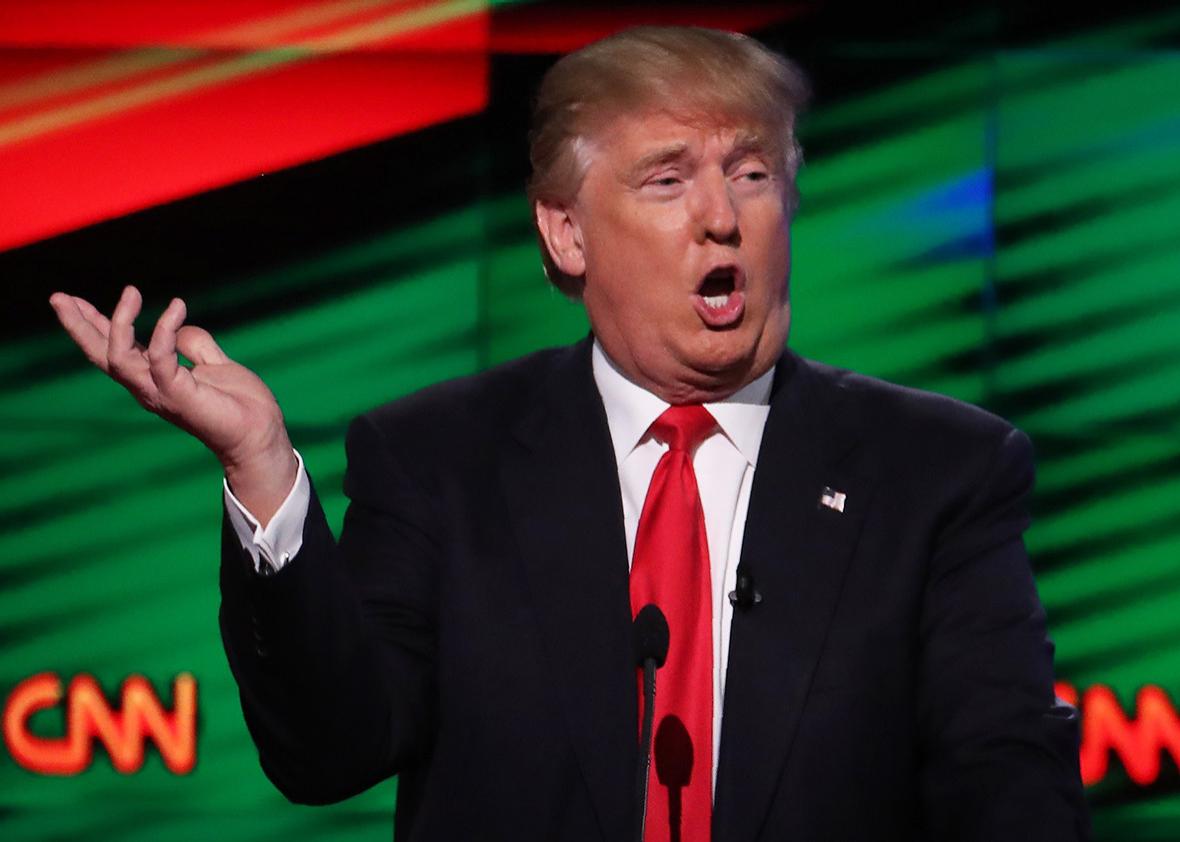Much of the Republican establishment fears that Donald Trump’s slow march to the nomination is tearing the party in two. On the CNN debate stage Thursday night, Trump did his best to act as though he’s doing nothing of the sort. “We’re all in this together,” the real estate tycoon said during an early exchange over immigration, a comment that served as his mission statement for the night. “We’re going to come up with solutions. We’re going to find the answers to things.” In case anyone at home missed the message, Trump made it explicit in his next breath: “I cannot believe how civil it’s been up here.”
Trump’s assessment of the action onstage was a fair one. Thursday’s debate was about as far as it could have been from the March 3 debate, which began with Trump making a dick joke and became only slightly less juvenile from there. Trump and his rivals spent much of Thursday night speaking in the type of calm, measured tones that were missing in many of the previous 11 debates. Ted Cruz, Marco Rubio, and John Kasich took a few soft jabs during the night, but none of them tried to connect with the type of headline-generating haymakers they’ve failed to land in the past.
Trump, meanwhile, was on his best behavior. Gone were the references to the size of his manhood; gone too were the personal insults directed at his opponents. Time and again, when pressed by the moderators or criticized by his rivals, Trump kept calm—be it after Kasich appeared to try to bait him into defending Vladimir Putin, or when Rubio railed against his position on Cuba. The cracks in Trump’s facade showed on occasion during a few exchanges with Cruz—but even then he opted for a minimalist approach we normally don’t see from him. “If you look back to Iowa, Ted did change his view and his stance on ethanol quite a bit,” Trump said at one point. “He did and—at the end. Not full on, but he did change his view in the hopes of maybe doing well.”
The only times we saw a hint of the Trump we’ve all come to know and loathe came in the first hour, when he made a quick aside about how “boring” the Democratic debate was, or in the second hour when he reminded everyone that he draws “much bigger crowds than Ted.” Even then, though, his tone and posture were noticeably restrained. At one point, he even came remarkably close to delivering a succinct explanation of how unemployment statistics are calculated—though he didn’t stick the landing. (He suggested that people who give up looking for work are counted as employed when, in reality, they’re counted as neither employed nor unemployed.)
Make no mistake, though: This was still Donald J. Trump. His sober tone may have distracted form his words, but if you listened closely, they still didn’t make sense. (The same could be said for all four men onstage: They all touted budget plans that simply don’t add up, and Rubio and Kasich denied and downplayed, respectively, the scientific consensus about man-made climate change.)
As always, though, Trump was the main attraction. The reality TV star touted his deal-making skills as a panacea for all of the country’s problems (“It’s gotta be a great deal, not a bad deal”), defended waterboarding and the targeting of terrorists’ families, and even found time to mention that he was once the grand marshal of the Israel Day Parade in New York City (which was no doubt the best, classiest, most terrific parade ever) as evidence he was the most pro-Israel candidate on the stage. (At another point, he said the words: “We have a serious, serious problem of hate”—which would have been the truest thing he has ever said if he were talking about his own campaign as opposed to his quest to not be “so politically correct.”)
Trump also managed to deftly—though disingenuously—dodge a question from CNN’s Jake Tapper about the troubling violence that has occurred at his rallies. “They love this country,” Trump said. “They don’t like seeing bad trade deals, higher taxes, they don’t like seeing a loss of their jobs where our jobs have just been devastated. And I know—I mean, I see it. There is some anger. There’s also great love for the country. It’s a beautiful thing in many respects. But I certainly do not condone that at all, Jake.” Tapper responded by reading a long list of all the comments Trump has made encouraging violence at the rallies—not unlike how last summer Fox News’ Megyn Kelly read out a litany of the horrible things Trump has said about women—but, this time, the Donald didn’t try to come back over the top.
Trump telegraphed his game plan to play it cool earlier in the week, and he clearly knew what he was doing on the CNN stage. The GOP front-runner is facing a well-funded #NeverTrump movement that’s built on the idea that he isn’t just a Democratic sheep in Republican wolf’s clothing; he’s a Democratic sheep in Republican wolf’s clothing who is also insane. Trump needs to counter that narrative in order to protect his delegate lead—and to make it more difficult for the GOP establishment to use a contested convention to block him from the nomination in the event he doesn’t win a majority of delegates by the time he gets to Cleveland this summer. He got help with that before the debate began Thursday, when Republican National Chairman Reince Priebus took the stage and told the crowd: “I want to get something completely clear because there’s been a lot of talk about this. This party is going to support the nominee—whoever that is—100 percent. There’s no question about that.”
Regardless of whether Trump believes that, on Thursday, he successfully played along.
